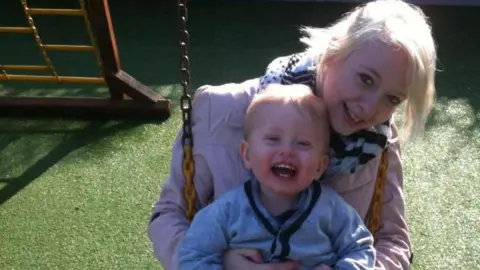Abuse victim fled ex but council left her in unsecure home
Leanne Crawford
BBC Yorkshire and Lincolnshire Investigations

 BBC
BBC
A woman who fled an abusive relationship said she had to barricade herself into her rented home every night for more than six months, because her council left her with a broken door lock.
Jane – not her real name – should have had extra home security, known as target hardening “within a couple of working days” of being classed as high risk, according to government guidelines.
North Kesteven District Council admitted a “significant failing” and offered Jane £100 in compensation for failing to secure her home in a timely manner.
The domestic abuse commissioner for England and Wales said “patchy” target hardening meant many victims were “living in daily fear” of their abuser turning up at their home. The government said it was increasing domestic abuse funding.
Since 2021, local authorities have had a legal duty to make sure domestic abuse victims have a safe place to live.
It means most councils in England now run a sanctuary scheme, which includes installing target hardening at a victim’s home, when they no longer live with their abuser.
The measures – such as alarm systems, extra locks, and fire-proof letterboxes – should be fitted “as soon as possible” following a risk assessment, according to the Ministry of Housing, Communities and Local Government (MHCLG).
‘I was shaking’
Jane, from Lincolnshire, said she had been told to expect extra security after leaving her partner in May 2024, which included fixing a broken lock. However, delays in completing the work left her living in “terror”.
She said she was “completely failed” by the council, and did not sleep properly for six months as her patio door did not lock.
“Every time I looked at the door, it made me feel sick,” said Jane.
“One night, there was a bang outside and I was shaking in the kitchen, I was retching in the sink, because I was terrified he was there and was about to come in and murder me.”
It became a nightly routine for Jane to “barricade” her sliding patio door with household items, such as chairs, tables and an ironing board.
Until November 2024 she said she spent her evenings in silence, listening for any sign of her ex-partner outside.
“I felt completely unsafe. It was horrific,” said Jane.
Women are most at risk of being killed by their ex-partner in the first month after leaving an abusive relationship, according to statistics from the Femicide Census.
“That fact that Jane waited so long put her life at risk,” said Claire Chamberlain, who runs domestic abuse organisation Clear Path UK.
The domestic abuse commissioner, Dame Nicole Jacobs, said target hardening was a “postcode lottery”, and some victims were being “driven into homelessness” because it was becoming “too dangerous” to stay in their homes.
“This is simply not good enough,” she said.
Caroline Vincent, 50, from Chapel St Leonards, is calling for change and believes her daughter and grandson might still be alive today if they had been offered target hardening.


Bethany Vincent, 26, and her nine-year-old son Darren Henson, known as DJ, were murdered at their home in Louth, in 2021.
They were stabbed to death by Bethany’s ex-partner, Daniel Boulton, who had walked 28 miles (45km) from a homeless hostel in Skegness, despite being under a restraining order.
A review into their deaths found there had been “little work” by agencies to target harden Bethany’s home.
The review said there were “obvious warning signs” Boulton was a “high risk” to Bethany and DJ, given his history of domestic abuse-related offences.
“No one came round and checked her property for her, even though he’d tried to break in before,” said Ms Vincent.
“They knew what he could be capable of, and if things were put in place it would be a totally different outcome.
“Not enough is being done. It makes me so angry that women are still being put at risk.”
Bethany’s council, East Lindsey District Council, did not respond to a request for comment.

 Facebook
Facebook
The Local Government Association is calling for the government to provide sufficient funding for target hardening to make sure “support reaches those who need it most, without delay”.
A spokesperson for the Ministry of Housing said: “We are increasing domestic abuse funding to councils by £30m this year so that victims can get the support they need in safe, secure accommodation and we expect councils to deliver this.”
Campaigner Emma Storey, chief executive of the Domestic Abuse Housing Alliance (DAHA), said she was aware of the “challenges” facing the sector.
Ms Storey said in some cases there were issues making contact with landlords, and also problems gaining permission for target hardening works, despite efforts to persuade them it was a “positive” step.
- If you’ve been affected by issues in this report there is help and advice at BBC Action Line
DAHA has made a toolkit, recognised by the Home Office, which sets out steps local authorities can take to improve their response to housing for victims.
But not all local authorities have signed up.
In a letter to Jane, seen by the BBC, North Kesteven District Council said it could not offer any explanation for the delay in installing her extra security.
“There has clearly been a significant failure within our processes that has led to the works not being undertaken in an acceptable timeframe and resulted in this unacceptable level of service,” the letter stated.
The council said it would carry out a review of its procedures, and also apologised for a “lack of communication” with Jane, who had made repeated calls for the target hardening works to be done.
In a further statement, to the BBC, the council said sometimes delays were because of a lack of available contractors. It added that target hardening does not cover all home repairs that might need doing.
Jane also raised her concerns over the council’s delays, with the domestic abuse commissioner.
In a letter seen by the BBC, the commissioner’s office described Jane’s case as “appalling” and said it had raised “serious concerns”.
Jane said living in constant fear had affected her job, her mental health and her relationships with other people.
“I don’t want anybody to go through the terror that I had for six months,” she said.
“I shouldn’t have had to be in fight or flight mode when target hardening is meant to be there to prevent this happening.”







